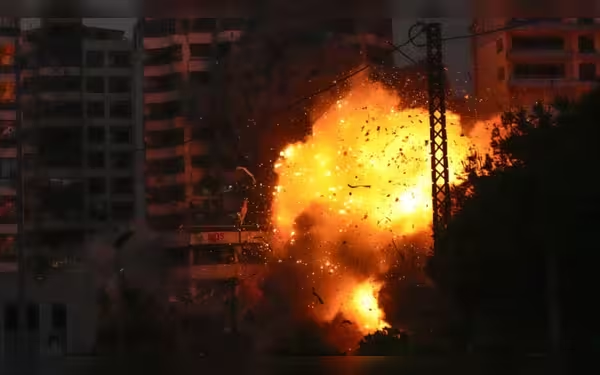Tuesday, December 24, 2024 02:24 AM
Israel's Security Cabinet to Decide on Ceasefire as US Reports Progress
- Israel's security Cabinet to decide on ceasefire soon.
- US expresses optimism about a potential peace deal.
- Hezbollah's heavy weapons may be relocated under agreement.
 Image Credits: channelnewsasia
Image Credits: channelnewsasiaIsrael's security Cabinet is set to decide on a ceasefire as the US reports significant progress in negotiations with Hezbollah.
In recent weeks, the conflict between Israel and Hezbollah has escalated significantly, drawing international attention and concern. The situation, which has been tense since late September, has led to a series of violent confrontations, resulting in numerous casualties and widespread destruction. As the fighting continues, the prospect of a ceasefire has emerged, with various global powers, including the United States, European Union, and United Nations, actively advocating for peace.
On November 25, an Israeli official revealed that Israel's security Cabinet is set to make a crucial decision regarding a proposed ceasefire in the ongoing war with Hezbollah. The White House has expressed optimism, stating that a deal to end the fighting in Lebanon is "close." This development comes amid reports from Lebanon's health ministry indicating that Israeli airstrikes have resulted in the deaths of at least 31 individuals, primarily in southern regions.
US National Security Council spokesman John Kirby conveyed a sense of hope regarding the ceasefire negotiations, emphasizing that while progress has been made, the parties involved are not yet at the finish line. He stated, "We believe we've reached this point where we're close," highlighting the ongoing discussions aimed at achieving a truce.
France has also played a pivotal role in facilitating talks for a ceasefire, reporting "significant progress" in negotiations. The French presidency has urged both Israel and Hezbollah to "seize this opportunity" for peace. Italy, currently holding the rotating presidency of the G7, has expressed optimism about the potential for a ceasefire in Lebanon.
According to reports, the proposed agreement may include a 60-day transition period during which the Israeli army would withdraw, the Lebanese army would reposition near the border, and Hezbollah would move its heavy weapons north of the Litani River. Additionally, a US-led committee is expected to oversee the implementation of the agreement, with assurances that Israel can respond to imminent threats if the Lebanese military fails to act.
However, challenges remain. Analysts have pointed out that the biggest hurdle will be the enforcement of the agreement, particularly regarding who will control the area north of the Israeli border to the Litani River. Javed Ali, an associate professor at the University of Michigan, noted that Israel has indicated it will resume attacks on Hezbollah if it perceives any violations of the ceasefire terms.
As the situation unfolds, the Israeli military has continued its operations, conducting a series of strikes targeting Hezbollah positions in Lebanon. These actions have raised concerns about the potential for further escalation and the impact on civilian populations caught in the crossfire.
While the prospect of a ceasefire between Israel and Hezbollah appears to be on the horizon, the path to peace remains fraught with challenges. The international community's involvement is crucial in ensuring that both parties adhere to any agreements reached. As the world watches closely, the hope for a lasting resolution to this conflict grows, underscoring the importance of dialogue and diplomacy in addressing the underlying issues that have fueled this long-standing rivalry.













